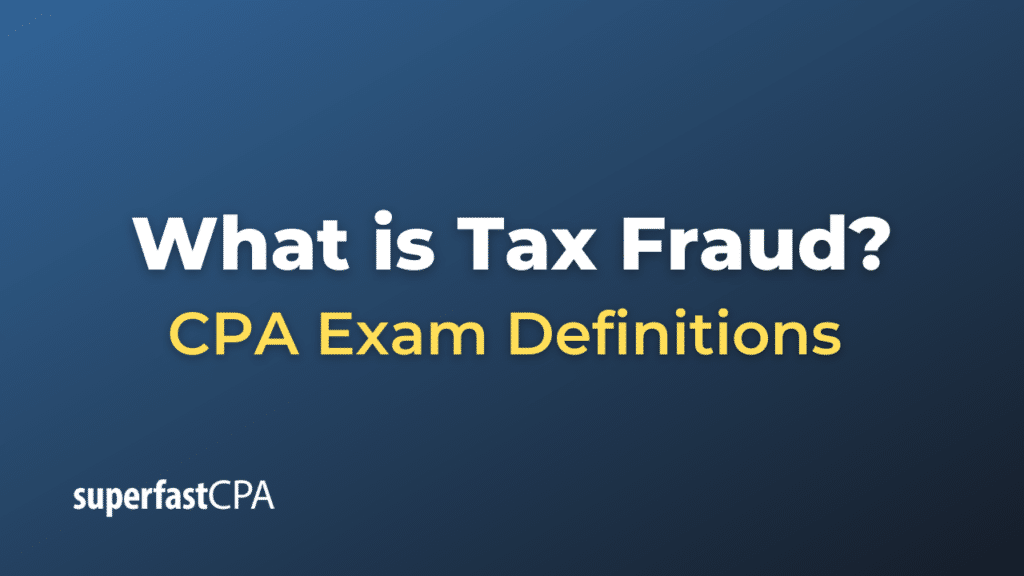Tax Fraud
Tax fraud refers to the act of willfully and knowingly providing false information on a tax return with the intent to avoid paying taxes that are rightfully owed. It involves deceit, concealment, or making false representations to reduce tax liability. Tax fraud can be committed by either individuals or businesses and is a crime punishable by penalties, fines, interest, or even imprisonment.
Key aspects of tax fraud include:
- Intent: Tax fraud is distinguished from mere negligence or mistakes due to the element of intent. It involves deliberate actions to defraud tax authorities.
- Common Types of Tax Fraud:
- Underreporting Income: Intentionally reporting less income than was actually earned.
- Claiming False Deductions: Inflating expenses or claiming deductions for expenses that were never incurred.
- Hiding Money and Assets : Concealing money in offshore accounts or transferring assets to evade taxes.
- Engaging in Identity Theft: Using someone else’s identity to claim fraudulent tax refunds.
- Filing False Documents: Submitting false tax documents or altering documents to deceive tax authorities.
- Claiming Personal Expenses as Business Expenses: For instance, claiming a personal vacation as a business trip.
- Consequences: Depending on the jurisdiction, the severity of the fraud, and the amount of tax evaded, consequences can range from substantial fines and penalties to imprisonment.
- Difference from Tax Evasion: While both tax fraud and tax evasion involve intentional acts to avoid paying taxes, tax fraud specifically refers to deceit, subterfuge, or the falsification of documents. Tax evasion can be seen as a subset of tax fraud.
- Detection and Audits: Tax authorities around the world use various tools and methods to detect inconsistencies or suspicious activities in tax returns. Anomalies may trigger audits, during which taxpayers must provide evidence to support the information in their returns.
- Voluntary Disclosure Programs: Some jurisdictions offer voluntary disclosure or amnesty programs. These programs allow taxpayers to come forward and correct past wrongdoings, often with reduced penalties or other incentives.
Given the serious consequences associated with tax fraud, it’s crucial to ensure accuracy and honesty in all tax dealings. Those unsure about the proper interpretation or application of tax rules should consult with tax professionals or legal experts.
Example of Tax Fraud
Let’s illustrate tax fraud using a hypothetical example:
Scenario:
David is a successful freelance graphic designer who has multiple clients from different regions. Over the past year, he earned $200,000 in fees from his design services. However, instead of reporting his full earnings, David decides to only declare $150,000 on his tax return, purposely omitting $50,000.
In addition to this, David had recently gone on a luxurious vacation to the Maldives. Even though this trip was purely for personal leisure, he decided to report it as a business expense, claiming he attended a non-existent design conference.
Tax Fraud Tactics Used:
- Underreporting Income: David intentionally did not declare $50,000 worth of his income, thereby evading taxes on this sum.
- Claiming False Deductions: David deceitfully reported his personal vacation as a business expense, which not only reduced his taxable income but was also a fictitious claim.
Consequences:
A few months later, the tax authority started an audit on random profiles and David’s file was chosen. During the audit:
- The authority cross-referenced payments made to David from his clients and found discrepancies that revealed the additional $50,000 income.
- They also asked for documentation to validate the business trip to the Maldives. David failed to produce any relevant business conference details or meetings during the trip.
After confirming these discrepancies, the tax authority determined that David had committed tax fraud. As a result:
- David was required to pay back the taxes owed on the unreported income and the falsely claimed deduction.
- He was charged a substantial penalty for fraudulent reporting.
- He was also assessed interest on the unpaid tax from the date it was due.
- Considering the severity and willfulness of the deception, David also faced the possibility of criminal charges and potential jail time.
Aftermath:
Beyond the immediate financial and legal consequences, David’s professional reputation was significantly tarnished. The news of the fraud spread in his industry, causing mistrust among potential clients, leading to reduced business opportunities.
This example underscores the risks and potential repercussions of engaging in tax fraud. Always being truthful and transparent in tax dealings is imperative.













